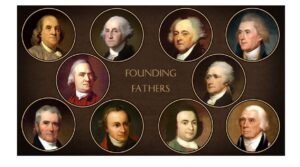
I think he was right. Especially, as it appears that the founding fathers looked at the way the Greek city states ran their democracy.
You see, at the time of American independence, 13 independent colonies came together to declare their independence from Britain. Then on May 25, 1787, they got together with a blank piece of paper at the Pennsylvania State House in Philadelphia to write a constitution for their new United States of America.
The individual states wanted to keep their independence, but to have the security of being part of a greater body, the United States of America.
So, when they met, they had already in their mind the ideal of democracy and the Rule of Law. The founding fathers had studied the ancient Greek philosophers’ texts on the principles of a democratic society.
They looked into history, first at the Roman system, but they weren’t excited by it. They then examined the Ancient Greek form of democracy that was based around a “Polis”.
What is an Ancient Greek Polis?
A structured community made up of a town, usually walled, with a sacred centre on an acropolis or harbour, controlling the surrounding territory. Basically, they were the city states in the Greek Archipelago, all of which had their own political, judicial, legal, religious, social institutions and practices.
They were in effect their own individual state, involved in international affairs, both with other poleis and non-Greek states for trade, political alliances, and wars. There had been similar cultures earlier by the Babylonians, Etruscans and Phoenicians, but not with a democratic structure.
How many were there in the Greek world?
It appears that in the end there were nearly 1,000 poleis in the Greek World, but most were very small. However, you might have heard of the important ones Athens, Sparta, Corinth, Thebes, Syracuse, Aegina, Rhodes, Argos, Eretria, and Elis. The biggest was Sparta, they were nuts, always fighting neighbours, until the whole Archipelago was attacked, they then combined with the others. The larger Polis’s, such as Athens, Rhodes and Syracuse, had powerful navel fleets allowing them to control and spread their influence across the Aegean Sea.
How did the US Constitution use this?
Well, the founding father decided to keep to a structure resembling the Greek City-State, so the states would be governed at a local level. Just like the City States, however, they needed unity of a and decided that there should be dominant authority above them all. The 13 colonies then become the first states of this newly established country.
The voting system
The principle in these Ancient Greek Cities was that every citizen could speak his mind and vote. Citizens could also elect to serve as organizers, decision-makers, and judges.
However, there was a catch, to vote you had to be:
- a citizens of the city-state
- male
- over the age of 18
Women, slaves, and conquered peoples could not vote in the assembly or even be chosen to serve on councils.
Originally the founding fathers felt such rules for voting should be retained. For this reason, they decreed that only certain people should be allowed to vote, fortunately slowly over the years the franchise has been widened.
 Athens – the Birth of Democracy
Athens – the Birth of Democracy
At our sister site Educational Musicals we believe that all children should know about Democracy which first evolved 2,500 years ago in the city state of Athens. When in 404BC Hippias, the worst possible type of tyrant, did something extraordinary, which was turned by Cleisthenes and later Ephialtes and Pericles into the first democratic state.
This is a story that developed over several years which we have fictionalised into a 50-minute musical that appears to happen in that short time scale. It has been written so that our children understand democracy and its importance.
Go to Athens-the Birth of Democracy where you can hear two of the songs and read two pages of script then download the show.
Isn’t history fun?
10 questions to ask:
- How did President Donald Trump connect the achievements of the Greek people with the shaping of Western civilization?
- How did the founding fathers of the United States draw inspiration from the Greek city-states in shaping the nation’s democracy?
- What role did the Pennsylvania State House play in the drafting of the United States Constitution?
- What were the founding principles of democracy and the Rule of Law that the American founding fathers derived from ancient Greek philosophers?
- What distinguished the Ancient Greek Polis as a structured community, and how did it influence the development of democracy?
- How did the concept of individual states maintaining independence while forming a greater body reflect the principles of the Greek city-states?
- What were the characteristics of the Ancient Greek Polis that made it a unique political and social entity?
- How did the larger Greek Polis, such as Athens and Sparta, exert influence and control over their territories and neighboring regions?
- In what ways did the structure of the United States Constitution resemble that of the Greek City-State?
- What were the criteria for citizenship and voting rights in the Ancient Greek City-States, and how did they influence the initial voting regulations in the United States?
For more information the greek influence try:
https://www.heritage.org/the-essential-constitution/the-origins-the-us-constitution
© Tony Dalton


 Athens – the Birth of Democracy
Athens – the Birth of Democracy